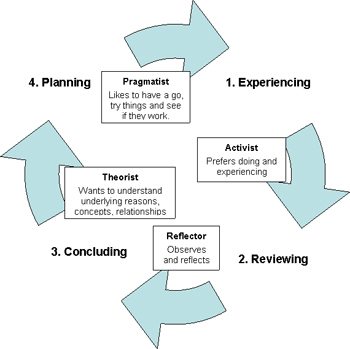|
This learning model was developed from the Kolb's experiential model. Two modifications were made. The stages in the cycle were renamed in accordance with managerial experiences of decision making/problem solving.
Honey accepted the notion that learning from experience is a four state process:
- Having an experience
- Reflecting on it
- Reaching conclusions from the experience
- Putting their theory into practice
The styles were directly aligned to the stages in the cycle and named Activist, Reflector, Theorist and Pragmatist.
This cycle shows more accurately how knowledge is acquired.
Learning Style Questionnaire
Kolb's LSI model was having a low validity with managers, so Honey & Mumford developed their Learning Styles Questionnaire.
The LSQ is a self-development tool and differs from Kolb's Learning Style inventory by inviting managers to complete a checklist of work-related behaviors without directly asking managers how they learn. Having completed the self-assessment, managers are encouraged to focus on strengthening underutilized styles in order to become better equipped to learn from a wide range of everyday experiences.[1]
According to an Ipsos Mori (one of the leading political, social and business research companies in the UK and Ireland) survey done in 1999, the Honey & Mumford Learning Styles Questionnaire is the most widely used system.
| 